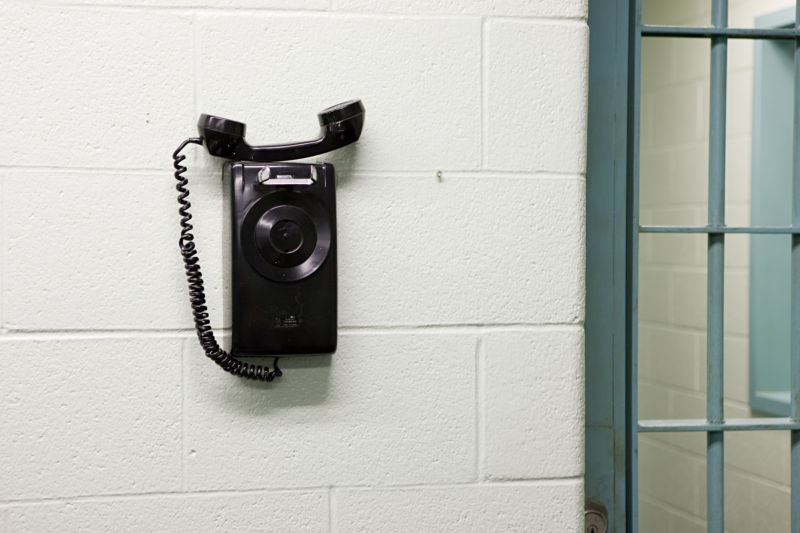
Federal Communications Commission Chairman Ajit Pai is urging state governments to impose price caps on prison phone calls, three years after Pai helped kill Obama-era FCC rules that limited the price of such calls.
Pai yesterday sent a letter to the National Association of Regulatory Utility Commissioners (NARUC), saying it is up to state governments to cap intrastate calling prices because the FCC lacks authority to do so. (NARUC represents state utility regulators.) Pai wrote:
Given the alarming evidence of egregiously high intrastate inmate calling rates and the FCC’s lack of jurisdiction here, I am calling on states to exercise their authority and, at long last, address this pressing problem. Specifically, I implore NARUC and state regulatory commissions to take action on intrastate inmate calling services rates to enable more affordable communications for the incarcerated and their families.
Pai’s letter did not mention that his own actions helped cement the status quo in which the FCC does not regulate intrastate prices. It’s well-established that the FCC can regulate interstate rates, those affecting calls that cross state lines. Pai is even proposing to lower the FCC-imposed rate caps on interstate calls from 25¢ to 16¢ per minute in an order the FCC will vote on next month. But Pai’s plan doesn’t limit prices on intrastate calls, those in which the prisoner and the person on the other end of the line are in the same state.
Under then-Chairman Tom Wheeler, the Obama-era FCC did try to limit intrastate prices, but those efforts were repeatedly shot down by court rulings. Shortly after President Trump appointed Pai to replace Wheeler in early 2017, Pai instructed FCC lawyers to drop the commission’s court defense of a cap on intrastate calling rates. That helped lead to a June 2017 court victory for prison phone company Global Tel*Link in its lawsuit against the intrastate cap.
Pai “could’ve fought harder”
As Pai explains it in his proposal to further limit interstate calling rates, the FCC “has not always respected” the Communications Act’s division of jurisdiction between the FCC and states. “Because the Commission has not always respected this division, the US Court of Appeals for the District of Columbia Circuit has twice remanded the agency’s efforts to address rates and charges for inmate calling services,” Pai’s proposal says. Pai’s letter yesterday said that NARUC itself “has consistently made clear its view that the FCC has no authority, and should not attempt to exercise authority, to regulate intrastate rates.” NARUC has taken that position both in FCC filings and in litigation, Pai wrote.
But as UC Berkeley Law professor Tejas Narechania wrote on Twitter yesterday, the court’s interpretation of US law is “an interpretation of current law [that Pai] sought, and he could’ve fought harder to correct.”
The Wheeler-led FCC in October 2015 imposed caps on intrastate rates, arguing that it had legal authority to do so under Section 276 of the Communications Act, which says the FCC is charged with implementing Congress’ directive “that all payphone service providers [be] fairly compensated for each and every completed intrastate and interstate call.”
Pai voted against the October 2015 order as a member of the FCC’s then-Republican minority, saying it exceeded the FCC’s authority, and dropped the FCC’s court defense of the order after Republicans took the commission majority. Narechania wrote that “under Pai’s leadership, the FCC decided that ‘fair’ meant only fair to the carrier. Not to the consumer. So while these rates were unfair to inmates, they were more than fair to the carriers.”
Pai denounces “egregiously high” prices
Pai’s letter to NARUC said that in the absence of FCC regulation, intrastate prices have far exceeded interstate ones:
FCC staff analysis has revealed that providers of inmate calling services are charging egregiously high intrastate rates across the country. Intrastate rates for debit or prepaid calls substantially exceed interstate rates in 45 states. Thirty-three states allow rates that are at least double the current federal cap, and 27 states allow excessive “first-minute” charges up to 26 times that of the first minute of an interstate call. Here are some numbers: For an interstate call, the first-minute charge may not exceed 25 cents [under FCC rules] today, but for an intrastate call, first-minute charges may range from $1.65 to $6.50. Indeed, Commission staff have identified instances in which a 15-minute intrastate debit or prepaid call costs as much as $24.80—almost seven times more than the maximum $3.15 that an interstate call of the same duration would cost.
According to Pai’s letter, this is “unfortunately a problem the FCC is powerless to address” but “state commissions around the country… can do something about it.” Pai wrote that about 80 percent of inmate calls are intrastate and that “the burden of egregious rates for intrastate inmate calling services does not fall equally on everyone” because “African-Americans are disproportionately represented among the incarcerated. They and their families are thus disproportionately reliant on inmate calling services. Yet they and their families tend to have lower incomes, making them particularly vulnerable to these exorbitant intrastate rates.”
Pai wrote that NARUC has made statements condemning discrimination but that the state governments NARUC represents haven’t taken enough action to limit prison phone prices. “These are noble sentiments. But it is time for these sentiments to manifest in action,” Pai wrote.
We contacted NARUC about Pai’s letter today and will update this article if we get a response.
https://arstechnica.com/?p=1693248

